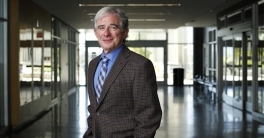A Legacy of Innovation, Compassion, and Leadership in Spine Surgery and Beyond
With a penchant for math and science, Steven R. Garfin, M.D., always figured he would do something related to science, but as an undergraduate student at the University of Minnesota, he had no idea how his career would turn out or the incredible impact that he would have on thousands of lives.

















